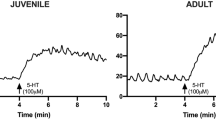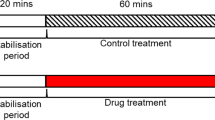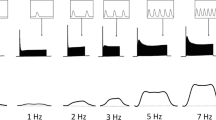Abstract
THE rates of uptake and loss of radioactive tracers by excitable tissues can often be described by a function involving one exponential term1–3, but over relatively long periods deviations have been observed from such a simple course4–7. The rates of exchange towards the end of such periods are commonly slower than would be predicted from the initial rates and two general causes for this behaviour have been suggested: either the rates are, in fact, diminishing during the course of an experiment or the tissue is not behaving uniformly. This latter possibility has been extensively investigated1,8–15, because biological material shows an obvious lack of uniformity, and because deviations from single exponential behaviour are observed even when the stoichiometric composition of the tissue remains constant. However, a constant composition is not proof of constant exchange rates but might be maintained if all exchanges in the system slowed down, corresponding perhaps to the slow deterioration of the in vitro preparation, or indeed if movement stopped altogether. One might expect deviations due to the ageing of the tissue to be more marked the longer the duration of an experiment, and the uptake of potassium-42 by the smooth muscle of the guinea pig tænia coli has now been examined for such an effect since it only shows serious deviations from single exponential behaviour after 5 h12.
This is a preview of subscription content, access via your institution
Access options
Subscribe to this journal
Receive 51 print issues and online access
$199.00 per year
only $3.90 per issue
Buy this article
- Purchase on Springer Link
- Instant access to full article PDF
Prices may be subject to local taxes which are calculated during checkout
Similar content being viewed by others
References
Harris, E. J., and Burn, G. P., Trans. Faraday Soc., 45, 508 (1949).
Sheppard, C. W., and Martin, W. R., J. Gen. Physiol., 33, 703 (1950).
Keynes, R. D., and Lewis, P. R., J. Physiol., 113, 73 (1951).
Solomon, A. K., J. Clin. Invest., 28, 1297 (1949).
Sheppard, C. W., Martin, W. R., and Beyl, G., J. Gen. Physiol., 35, 691 (1951).
Harris, E. J., J. Physiol., 120, 246 (1953).
Rayner, B., and Weatherall, M., Brit. J. Pharmacol., 12, 371 (1957).
Sheppard, C. W., J. App. Phys., 19, 70 (1948).
Creese, R., Neil, M. W., and Stepherson, G., Trans. Farad. Soc., 52, 1022 (1956).
Harris, E. J., J. Gen. Physiol., 41, 169 (1957).
Keynes, R. D., and Swan, R. C., J. Physiol., 147, 591 (1959).
Goodford, P. J., and Hermansen, K., J. Physiol., 158, 426 (1961).
Weatherall, M., Proc. Roy. Soc., B, 156, 57 (1962).
Goodford, P. J., J. Physiol., 163, 411 (1962).
Persoff, D. A., J. Physiol., 152, 354 (1960).
Author information
Authors and Affiliations
Rights and permissions
About this article
Cite this article
BAUER, H., GOODFORD, P. & HÜTER, J. Influence of Duration of Experiment on Rate of Uptake of Radioactive Potassium in Smooth Muscle. Nature 200, 1104–1106 (1963). https://doi.org/10.1038/2001104b0
Issue Date:
DOI: https://doi.org/10.1038/2001104b0
Comments
By submitting a comment you agree to abide by our Terms and Community Guidelines. If you find something abusive or that does not comply with our terms or guidelines please flag it as inappropriate.



